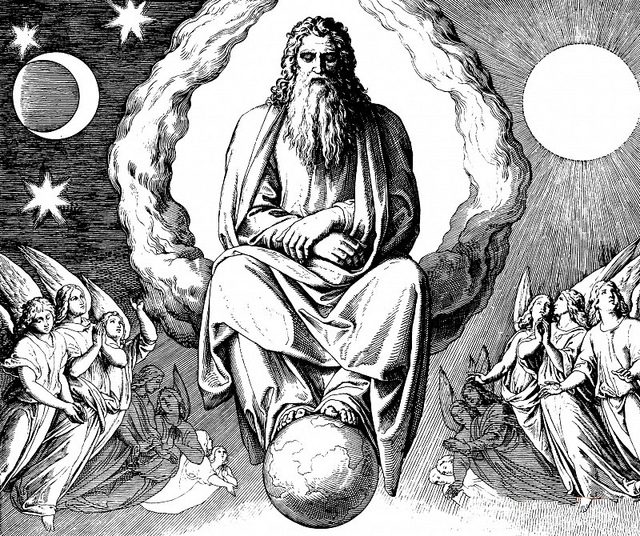
Church documents apparently do not specifically say that God doesn’t or can’t change His mind. It doesn’t follow, however, that God changing His mind is not prohibited by the statements about immutability and simplicity and omniscience and God’s timelessness. My argument is that it follows inexorably from simple deduction, from several Church dogmas, that God could not change His mind. There are at least four ways to demonstrate this, by straightforward reasoning:
Argument Against God “Changing His Mind” from Immutability
1) God is immutable.
2) Immutability means a complete absence of change.
3) Change of mind is a change.
4) But God can’t change at all.
5) Therefore, God does not change His mind.
6) And to assert that He does is to assert heresy (in the category of theology proper: “theology of God”).
*****
Ben Douglass produced another similar argument:
Argument Against God “Changing His Mind” from Simplicity
1) Major: God’s essence doesn’t change.
2) Minor: God’s mind is identical with His essence.
3) Conclusion: God’s mind doesn’t change.
4) (Both the major and the minor are dogma. Hence denying the conclusion requires one to deny a dogma.)
*****
Here are two more that I constructed:
Argument Against God “Changing His Mind” from Omniscience
1) Omniscience is knowing all that can be known, including all facts and events and concepts and notions; having all knowledge.
2) Grant (based on the Bible) that God judges good and evil acts, which cause human beings to be treated differently (both temporally and eternally), based on what they believe and what they do.
3) Person X is informed by God in revelation that if he does righteous set of behaviors and espouses set of beliefs A he will be treated by God in the fashion of A2, but if he does evil set of behaviors and espouses set of beliefs B he will be treated by God in the fashion of B2.
4) Now the question is whether God “gets” to the place in time where X chooses either Aor B, and then “changes His mind” according to what X chooses, and moreover, whether He can determine to make this change from eternity, yet remain omniscient.
5) Considered apart from the question of time and eternity or atemporality, let’s look at it strictly from the internal logic of omniscience: can God “learn” something that cannot be considered as a piece of knowledge already incorporated into His understanding as a result of being omniscient, that would then determine what He decides, and cause Him to change course? The answer is no. This is self-contradictory.
6) God cannot “know all things” but then somehow learn fact or concept “Z” which will then cause Him to “change His mind.”
7) For concept Z is included in the set of all things that can be known.
8) And if it is included in that set, then God must have already known it from eternity and to eternity, because He knows all things and Z is one of those things.
9) Therefore, if God can arrive at piece of knowledge Z that He did not possess before, He could not possibly be omniscient, because He would not have already possessed all knowledge.
10) Nor can God “incorporate” this actuality of a change of mind within the sphere of His omniscience because changing from one decision to another based on human acts is itself a lack of knowledge (in other words, one with perfect, complete knowledge can’t change from one thing to another because that indicates precisely a lack of knowledge that eventually is rectified by further human knowledge, which would make God dependent on His creatures, which is yet another heresy and arguably blasphemous).
11) Ergo, the only choices available, given all these premises, are A) a “god” who is not omniscient, or B) an omniscient “God”: the God of traditional monotheism: Jewish, Catholic, Protestant, and Orthodox. There is no intermediate position of a supposedly “omniscient” God Who can somehow change His mind. He is either omniscient, in which it necessarily follows that no change of mind is possible, or He changes His mind, in which case He is necessarily not omniscient. Therefore, the notion of God “changing His mind” is fundamentally inconsistent with the dogmatic teaching of the Catholic Church concerning God’s omniscience.
1) Grant (based on the Bible) that God judges good and evil acts, which cause human beings to be treated differently (both temporally and eternally), based on what they believe and what they do.
2) Person X is informed by God in revelation that if he does righteous set of behaviors and espouses set of beliefs A he will be treated by God in the fashion of A2, but if he does evil set of behaviors and espouses set of beliefs B he will be treated by God in the fashion of B2.
3) Now the question is whether God “gets” to the place in time where X chooses either Aor B, and then “changes His mind” according to what X chooses.
4) But God cannot “get” to any particular place in time where He wasn’t already, because He is “at” all places in time, which are to us in our timebound temporality, past, present, and future.
5) If He can’t get to a different “place in time” because He is already present in all places in time, then there is no possibility of His changing His mind as a result of the information obtained at “place in time P”. He already knows (as an omniscient, eternal, timeless being) what takes place in what is, in human terms, the “future.”
6) If He already knows “now” all things that take place, then it is nonsensical to posit God “changing His mind” based on supposedly learning something as a result of progressing through time, as human beings do, since He does no such thing, and it is a false and unbiblical premise.
7) Omniscience and timeless eternity thus go hand in hand, because in order to know all things that will ever take place (including even what might have taken place, given other conditions: “middle knowledge”), one must have knowledge of all times in order to truly know everything. Without being timeless, God could also not exercise providence over human affairs or utter prophecies of what will definitely come to pass. Each doctrine of God affects all others, because they all stand together in a harmonious whole. Denying any one thus leads inexorably to a hopeless bundle of self-contradiction and logical nonsense.
The last two arguments are not perfectly refined or honed. I just dashed them off. Possibly one could find holes in them somewhere, but I think they are pretty strong and can withstand scrutiny, and rest assured that I would be more than happy to refine them further under direct examination. Few things motivate me more — to think more deeply –, than challenges.
A very interesting argument for divine impassibility, or absence of divine emotions or passion in the human sense, was posted on my blog last night by a guy who goes by “romanthescribe”. I modified it slightly for the purpose of concise argument, and made a few additional comments (in blue). I understand, of course, that Fatima is a non-binding private revelation. Nevertheless, for those who accept it in faith, the argument possesses, in my opinion, some considerable force:
Argument For Divine Impassibility from the Fatima Apparitions
1) In Church-approved apparitions like Fatima, the Virgin Mary is depicted as sad or even crying.
2) Are we to conclude, then, that the Virgin Mary is literally experiencing a decrease of her happiness in heaven as a result of the actions of men on earth?
3) This would entail her lying or “play acting, ” since it is a dogma of the Church that suffering for us ends once we reach the beatific vision.
4) Therefore, the private revelations depicting Mary as sad or crying are just heaven’s way to convey to us the tragedy of sin. They are not meant to be taken literally (in other words, it is analogous to the non-literal anthropopathism with regard to God and how He also presents Himself to mankind).
5) If creatures are perfectly happy in heaven, then how much more, God? A stream can’t rise above its source. Therefore, this is yet another argument for the general case for immutability and biblical anthropopathism.
***
(originally 1-26-09)
Photo credit: Waiting For The Word (3-21-11) [Flickr / CC BY 2.0 license]
***












